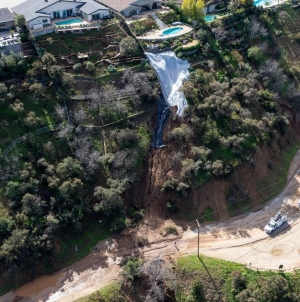-
U.S. Raises Concerns About Israel’s Plan of Action in Gaza, Officials Say - October 24, 2023
-
A portion of Mulholland Drive, damaged by mudslides in winter storms, reopens - May 26, 2024
-
‘Maybe You Don’t Want to Win’ - May 26, 2024
-
Donald Trump Putting Law Enforcement in Danger: Attorney - May 25, 2024
-
Avoid the waters of these 5 L.A. County beaches this holiday weekend, public health officials say - May 25, 2024
-
Bawdy Comedy ‘Anora’ Wins Palme d’Or at Cannes Film Festival - May 25, 2024
-
Map Shows Heat Wave Zone Spread Into Five New States - May 25, 2024
-
Azusa police arrest suspected slingshot-wielding vandal - May 25, 2024
-
Donald Trump Hammers Judge Ahead of Jury Instructions - May 25, 2024
-
Sometimes U.S. and U.K. Politics Seem in Lock Step. Not This Year. - May 25, 2024
U.S. Raises Concerns About Israel’s Plan of Action in Gaza, Officials Say
The Biden administration is concerned that Israel lacks achievable military objectives in Gaza, and that the Israel Defense Forces are not yet ready to launch a ground invasion with a plan that can work, senior administration officials said.
In phone conversations with his Israeli counterpart, Yoav Gallant, Defense Secretary Lloyd J. Austin III has stressed the need for careful consideration of how Israeli forces might conduct a ground invasion of Gaza, where Hamas maintains intricate tunnel networks under densely populated areas.
Biden administration officials insisted that the United States had not told Israel what to do and still supported the ground invasion. But the Pentagon has sent a three-star Marine, Lt. Gen. James Glynn, along with other officers to help the Israelis with the challenges of fighting an urban war.
A Pentagon official said on Monday that the deployment of General Glynn, reported earlier by Axios, did not mean the Pentagon was making decisions for Israel. General Glynn, the official said, would not be on the ground in Israel if an incursion into Gaza begins.
Israeli officials in Washington did not immediately respond to requests for comment. But on Sunday, a diplomat from the Israeli Embassy denied that the U.S. government was advising the Israelis to delay the ground invasion. “The U.S. is not pressing Israel in regards to the ground operation,” the diplomat said.
In his conversations with Mr. Gallant, Mr. Austin has described the hard-fought campaign to clear the Iraqi city of Mosul of Islamic State fighters in 2016 and 2017. At the time, Mr. Austin was the head of United States Central Command, and American troops were backing their Kurdish and Iraqi counterparts in the fight.
“The first thing that everyone should know, and I think everyone does know, is that urban combat is extremely difficult,” Mr. Austin told ABC News’s “This Week” on Sunday.
He said that he had “encouraged” Mr. Gallant to “conduct their operations in accordance with the law of war.” American officials have become increasingly concerned that a ground invasion in Gaza could lead to a huge loss of civilian lives.
He was on the phone again with Mr. Gallant on Monday, Pentagon officials said, emphasizing “the importance of civilian protection.” In an emailed statement, Brig. Gen. Patrick S. Ryder, the Pentagon press secretary, said that the two men also discussed American security assistance to Israel.
But the administration is also concerned, the officials said, that the Israel Defense Forces do not yet have a clear military pathway to achieve Prime Minister Benjamin Netanyahu’s goal of eradicating Hamas. In conversations with Israeli officials since the Hamas attacks on Oct. 7, American officials said they have not yet seen an achievable plan of action.
President Biden has alluded to that publicly. During his speech in Tel Aviv last week, he warned that Israel would need “clarity about the objectives and an honest assessment about whether the path you’re on will achieve those objectives.”
American officials said that Israel must decide whether, for instance, to try to take out Hamas by using surgical airstrikes combined with targeted raids by special operations troops — as American warplanes and Iraqi and Kurdish troops did in Mosul — or to roll into Gaza with tanks and infantry, as American Marines and soldiers, along with Iraqi and British forces, did in Falluja in 2004.
Both tactics will result in heavy losses, U.S. officials said, but a ground operation could be far bloodier, for troops and civilians. At the Pentagon, many officials believe that the Mosul and Raqqa clearing operations in Iraq more than a decade after Falluja are a better model for urban warfare.
“One of the things we’ve learned is how to account for civilians in the battle space, and they are a part of the battle space, and we, in accordance of the law of war, we’ve got to do what’s necessary to protect those civilians,” Mr. Austin said on Sunday.
But both Mosul and Raqqa resulted in significant civilian casualties. While such figures can vary widely, The Associated Press put the number of civilians killed during the effort to rid Mosul of Islamic State fighters at between 9,000 and 11,000. And the Islamic State had only two years to prepare defenses in Mosul, argued Michael Knights, a fellow with The Washington Institute.
“Hamas has had 15 years to prepare a dense ‘defense in depth’ that integrates subterranean, ground-level and aboveground fortifications, communication tunnels, emplacements and fighting positions,” Mr. Knights wrote in an analysis earlier this month, “as well as potential minefields, improvised explosive devices, explosively formed penetrator anti-armor mines and buildings rigged as explosive booby traps.”
Senator Jack Reed, a Rhode Island Democrat who heads the Armed Services Committee, called on Israel on Monday to delay a ground invasion of Gaza to buy time for hostage negotiations, allow more humanitarian aid to reach Palestinian civilians and give Israeli commanders more opportunity to fine-tune their urban-combat planning.
“From an operational standpoint, this is very complicated, and the more intelligence you gather and your troops can take into urban combat, the better,” Mr. Reed said by phone from Cairo, where he and other senators were wrapping up a trip to Saudi Arabia, Israel and Egypt. “A little extra time might be helpful. There are so many factors. Rushing into this probably is not the best approach.”
The Biden administration has given the same advice to Israel. Like U.S. officials, Mr. Reed said he also still supports the ground invasion to destroy Hamas. But he warned that a block-by-block urban fight in Gaza would be “a long-term effort,” noting that it took the Iraqi army, assisted by the United States, nine months to rout the Islamic State from Mosul.
Michael Crowley contributed reporting from Washington.
Source link































